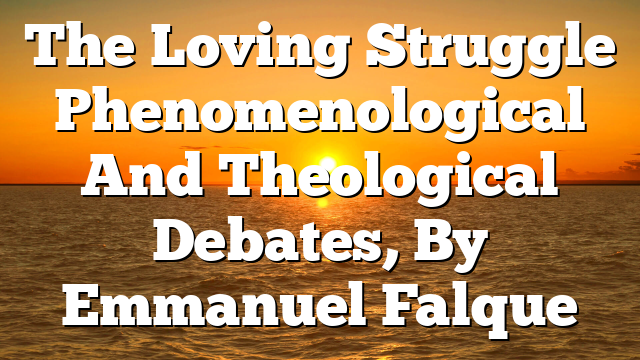318
Book Reviews
Emmanuel Falque,The Loving Struggle: Phenomenological and Theological Debates
(London,UK: Rowman & Littlefield International, 2018). 304 pp. $44.95 paper-
back.
Over the past thirty years, therehas been an explosionof philosophical and the- ological exploration in response to new developments in French Phenomenol- ogy. Many of the central figures that initiated this theological turn (Derrida, Levinas, Chretien, Henry, and Ricoeur) have passed and a second generation of phenomenological philosophy of religion has emerged, following in their wake. If the first wave of phenomenologists were attempting to defend the philo- sophical and methodological legitimacy of studying religious phenomenon, this second generation is beginning to take a reflexive look back at what this new school of phenomenology has generated and ways that it may have gone wrong. Perhaps no thinker has been more exemplary or prolific among this sec- ond wave than Emmanuel Falque.
Possessing doctorate degrees in both philosophy and theology, Falque has boldly crossed disciplinary boundaries to chart new courses for the phenom- enology of religion.While much of his work is still being translated into English, his philosophical contribution has already established him as a central voice in contemporary philosophy of religion. In this recent volume The Loving Strug- gle: Phenomenological and Theological Debates, capably translated by Bradley B. Onishi and Lucas McCracken, Falque stages a series of debates with his for- bearers and contemporaries. These encounters are modeled after the medieval practice of disputation, and as such involve a “loving struggle” that is less focused on violent attack and more on collaboratively wrestling towards unreached answers.
The book is structured in four major sections with a preface, opening, and an epilogue. The four sections fall under the headings, 1. Limitation (focus- ing on Jacques Derrida and Maurice Merleau-Ponty), 2. Revelation (Emmanuel Levinas and Jean Luc Marion), 3. Incarnation (Michel Henry and Jean-Louis Chrétien), 4. Experience (Jean-Yves Lacoste and Claude Romano), and they concludewithanepilogueengagingtheworkof JeanGreisch.Whilethevarious chapters can be read together fruitfully, each is engaged with a different thinker on a particular topic, and can, therefore, be read as individual units without losing any of their effect. The volume opens with an excellent introduction by Bradley B. Onishi on the development of phenomenology and philosophy of religion in the French philosophical milieu. Along with describing the upshot of Falque’s project for thinking about embodiment and affect theory, Onishi provides a history of both Catholic theology and French phenomenology in the 20th century.
Pneuma
© koninklijke brill nv, leiden, 2020 | doi:10.1163/15700747-04202021
1
Book Reviews
319
Falque devotes the first chapter of the book to describing both his method of engagement and goals for the volume. By wrestling with his philosophical precursors and contemporaries, he intends to both pay homage and to move the conversation forward.While Falque has particular commitments, bothphe- nomenological (he identifies himself as following primarily in the wake of Merleau-Ponty’s philosophy of embodiment rather than Heidegger’s philoso- phy of being) and theological (he identifies himself as following a Rahnerian path of theology from below rather than a Barthian or Balthasarian path of the- ology from above), he is not simply trying here to disprove the premises of his interlocutors. In fact, he is often most charitable to those authors who do not share his own theological or philosophical commitments (such as Levinas who was Jewish, and Derrida who claimed to rightly pass for an atheist), than those to whom he is theoretically closer (such as fellow Roman Catholic, Marion).
The following chapters contain engagements with all of the aforementioned thinkers on a variety of topics particular to each thinkers’ corpus, and as such, it would be impossible to rehash all of the debates engaged or insights offered in this brief review. However, I will flag a few of the debates that may be of most general interest to those engaged in either phenomenology of religion, philo- sophical theology, or Falque’s broader project.
While every chapter contains a variety of valuable explorations into vital questions concerning the nature of the gift, experience, embodiment, theol- ogy, and alterity, there were a few that stood out from the rest. The first is Falque’s engagement with Merleau-Ponty. Given his general emphasis on the importance of finitude, one could easily assume that Falque takes his philo- sophical cues from Martin Heidegger. However, this essay demonstrates that Falque’s intellectual debts to Merleau-Ponty run deeper than those to Heideg- ger, which makes him unusual among his contemporaries and may explain why he does not share their allergy to metaphysics. Also of note is the way that Falque takes his own doktorvater Marion to task for reticence to own his the- ological debts and for his obsession with the excessive at the expense of the mundane. Finally, Falque’s chapters on Romano and Jean Greisch could expose a number of English-speaking readers to these significant French thinkers that have as yet received less attention in North American philosophy of religion.
This is a book for those that are already engaged and familiar with the figures that are under discussion. If one is looking for an introduction to the phe- nomenology of religion and the various prominent figures in the contempo- rary discussions, they should likely look elsewhere. However, for those already familiar with the debates, this will become essential reading. Not only does Falque carefully explore his intellectual debts, but he also differentiates his positions from those of his peers and mentors in ways that are instructive for
Pneuma 42 (2020) 263–323
2
320
Book Reviews
other practitioners moving forward. Anyone that is interested in the relation- ship between philosophy and theology, phenomenology and metaphysics, or embodiment and revelation will greatly benefit from reading the various essays in this volume.
Austin M. Williams
Boston College, Chestnut Hill, Massachusetts,USA [email protected]
Pneuma 42 (2020) 263–323
3

Leave a Reply